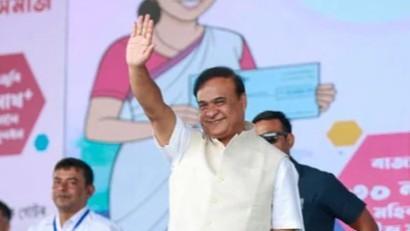
Assam CM helped Nitish work out ₹10,000 for women scheme: Report
In a recent development, it has been reported that the Chief Minister of Assam, Himanta Biswa Sarma, played a significant role in helping the Nitish Kumar government in Bihar devise a scheme to provide ₹10,000 to women. According to NDA leaders, a large part of the credit for this initiative goes to Sarma, who sent his bureaucrats to Bihar five months ago to share the ‘Jeevika ₹10,000 model’ with the state’s officials.
The move is seen as a significant step towards empowering women in the state, and the involvement of the Assam CM in this process is a testament to the cooperation and knowledge-sharing between different state governments. The scheme, known as the Mukhyamantri Mahila Rojgar Yojana, aims to provide financial assistance to women in the state, and the ₹10,000 grant is expected to benefit a large number of women, especially those from marginalized communities.
According to reports, the Assam CM’s bureaucrats made a presentation before the Bihar officials, showcasing the ‘Jeevika ₹10,000 model’, which was later incorporated into the Mukhyamantri Mahila Rojgar Yojana. The model, which has been successfully implemented in Assam, provides a one-time grant of ₹10,000 to women, which can be used for various purposes, including starting a small business, pursuing education, or meeting other financial needs.
The involvement of the Assam CM in this process highlights the importance of cooperation and knowledge-sharing between different state governments. It is not uncommon for states to learn from each other’s experiences and best practices, and in this case, the Assam CM’s initiative has helped the Nitish Kumar government in Bihar to devise a scheme that is expected to benefit a large number of women in the state.
The Mukhyamantri Mahila Rojgar Yojana is a significant initiative, and the ₹10,000 grant is expected to make a significant difference in the lives of women in Bihar. The scheme is expected to benefit women from all sections of society, including those from marginalized communities, and is seen as a step towards empowering women and promoting their economic independence.
The role of the Assam CM in this process is significant, and it highlights the importance of leadership and vision in driving positive change. By sending his bureaucrats to Bihar to share the ‘Jeevika ₹10,000 model’, Sarma has demonstrated his commitment to empowering women and promoting their economic independence. The success of this scheme will depend on various factors, including its implementation and the impact it has on the lives of women in Bihar.
The scheme is also expected to have a positive impact on the economy of the state, as the ₹10,000 grant is expected to increase the purchasing power of women, which in turn will boost demand for goods and services. This, in turn, is expected to have a positive impact on the local economy, creating new opportunities for employment and entrepreneurship.
In conclusion, the involvement of the Assam CM in the development of the Mukhyamantri Mahila Rojgar Yojana is a significant development, and it highlights the importance of cooperation and knowledge-sharing between different state governments. The scheme is expected to benefit a large number of women in Bihar, and its success will depend on various factors, including its implementation and the impact it has on the lives of women in the state.
The role of the Assam CM in this process is a testament to his commitment to empowering women and promoting their economic independence. By sharing the ‘Jeevika ₹10,000 model’ with the Bihar government, Sarma has demonstrated his willingness to cooperate and share knowledge with other state governments, which is essential for driving positive change and promoting development.
As the scheme is implemented, it will be important to monitor its progress and impact, and to identify areas for improvement. The success of the scheme will depend on various factors, including its implementation, and the impact it has on the lives of women in Bihar. However, with the involvement of the Assam CM and the commitment of the Nitish Kumar government, there is reason to be optimistic about the potential of the scheme to make a positive difference in the lives of women in the state.






